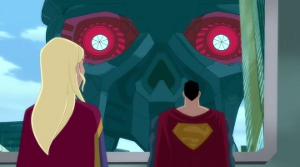
Immediately, you should ask yourself, What the fuck is up with that title? Are we going after that Quentin Tarantino demographic, Warner Brothers? Because if you are, you missed your chance when you fucked up Superman/Doomsday, back in 2007.
So you look this up on IMDB, because you’re a lazy hack who made the mistake of getting a “real” job back in 2008 instead of reading comic books, which would’ve been more fulfilling anyway, both spiritually and financially. That’s when you find this is based on an Action Comics arc by now-designated wunderkind Geoff Johns. And your heart sinks at the sight of his name. Or it should. Mine certainly does, because Johns is a mixed bag of a comic book writer if ever there was one.
My more conservative colleagues (the ones who still recoil in horror whenever Precious Bodily Fluids appear in comic books – after all, The Children might be watching, and these people can’t go a day without patronizing The Children – all of them, everywhere, including you; yes, you, because you are A Child if you don’t immediately agree with them and submit to their preferred proto-fascist Strong Father archetype) like to criticize his lack of restraint and habit of killing or sidelining characters he doesn’t like. Every writer does this to some degree, but Johns captured himself a fan base by deliberately doing it in the name of “fixing” certain excesses of the 1990s. Especially when it came to Green Lantern.
Like it or not, we would not have a live-action Green Lantern movie without Johns’ restoration of Hal Jordan (to the status of protagonist in the main Green Lantern book and, before that, to life itself) in 2004. Apart from that, all Johns really did was turn Hal into Maverick from Top Gun, only with a few more Daddy Issues. (Because there certainly weren’t enough of those in the DC Universe.) It’s a characterization that damned film captures in high definition, no mater what Johns’ apologists might say now that they know “their” movie sucks.
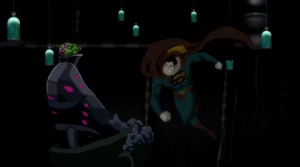
Regardless, Johns got into writing comics, not through Green Lantern, but through Superman. Specifically, Superman I and II. Films Johns felt accurately captured the essential essence of the character. Johns and I do not agree on this point. Or much of anything else, for that matter. And thanks to Johns’ own not-so-secret origin story, I know why. He got into comics by discovering a box full of issues from the ’60s and ’70s in his grandma’s attic, way before I was anything more than a drunken Halloween party my parents would barely remember afterward. By the time I was conscious enough to read, Johns was suffering through college, only getting back into things after he moved to New York in 1997…the year Superman went Electric Blue.
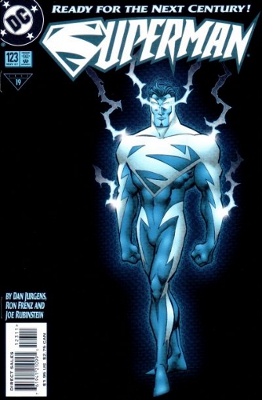
Yeah – 1997 was an all-around horrible year. “Ready For a New Century” my ass. That shit barely lasted twelve months. (Had to restore everything in time for the 60th anniversary, after all. Happy Birthday, Superman: we’ve used you to jerk people around for yet another successful year.) If DC ever wonders why it’s raised a generation of angry, cynical, bitchy fans who feel more like partners in an abusive relationship than consumers properly compensated for their purchases, all it needs to do is page through its own archives.
I get it, Geoff. I’m right there with ya. If lazy bastards decided to kill off “my” Green Lantern and replace him with an upstart dick, I’d be pissed, too. But without those dark times we would’ve never enjoyed the sweet, sweet glory of the early-2000s. Superman vs. The Elite sprang from that period. So did the notion of Lex Luthor as the Once and Future President of These United Fucking States. For an ever so brief moment, it looked like we might actually start having a real discussion about what “truth, justice and the American Way” meant in the age where anyone who wasn’t reading Image Comics might as well have walked through through their high school hallways in pink hot pants.
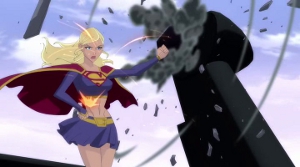
Then 9/11 happened, pushing that discussion off the table, onto the floor, and stomping its nuts until it started telling lies, just to make the pain stop. Same thing happened to Luthor’s presidency, as you saw dramatized in Superman/Batman: Public Enemies. Fallout from the Luthor Administration spread across multiple titles, but the re-introduction of Supergirl (filmed as Superman/Batman: Apocalypse) absorbed most of Clark Kent’s attention. At least until the next pressing of the Cosmic Reset Button in 2005 (Infinite Crisis, also written by Johns).
It was a softer reboot than the one that killed Johns’ favorite Flash back in 1986 – meaning DC Editorial made no plans to do anything with their “new” Universe whatsoever, beyond planning their next Cosmic Reset Button jamboree for 2008, “Final” Crisis. (Liars!) Between them, we have the run on Action Comics that became Superman: Unbound, starting in August, 2008. Believe me, getting all this out of the way now will save us time when we talk about the next adaption of a hot-selling Johns story, Flashpoint.
But first, Superman: Unbound, which is.. better than Apocalypse, at least, because it emphasizes story over fanservice. The cast of solid newcomers is universally acceptable, with no stand-outs either way, apart from John Noble’s creepy voice and Francis Conroy’s pitch-perfect Martha Kent. The animation is consistently tops, save for a few hiccups I’ll let the nitpickers on YouTube catch so they can declare this the “Worst Move Evhar” like they do. Reused shots evidence a cheapness creeping back into the WB bug house, and I question director James Tucker’s use of speed-lines during one fight…but his background directing episodes of Batman Beyond, Static Shock and the Legion of Superheroes TV series show through here. Dude knows how to compose interesting shots and how to properly follow superhuman action. As usual, live action directors should be taking notes. Your underpaid brothers and sisters, toiling in the animation ghetto, have spent the last twenty years putting on masters classes in this.
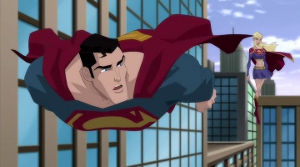
Going in, the big problems (as always) flowed from the DC Animated Universe’s post-2006 fear of continuity, which means some cognitive gymnastics are in order if you want to figure out when the hell this all takes place…especially if you’ve got thirty years of (in- and extra-universe) continuity rattling around your head and can summarize it all in a thousand words or less, only needing Wikipedia to double-check publication dates.
Once you’ve got a handle on when the hell you are in Superman’s life, Unbound‘s story unfolds in a refreshingly competent way, considering how many of these films abandon their interesting ideas by the side of the road, like unwanted puppies. In the months since Kara Zor-El crash-landed on Earth, Clark (Matt Boomer) has pawned her off on his parents like the insecure fuck he can sometimes be. Chafing at the confines of an Earthbound life and traumatized by her living memories of Krypton’s destruction, this Supergirl (Moly C. Quinn) took the most getting used to. Great Rao help you if you’re a teenage girl looking for a DC superheroine to “identify” with these days: the one in the cape-n-”S” combo is a PTSD survivor of a slow-motion planetary apocalypse, most of which she got to watch.
Is that a step up from her Apocalypse characterization as air-headed Disney Princess/Designated Kidnap Victim? I’m not sure. The result is this Supergirl comes pre-packaged with the #1 Selling Point of modern America comics: angst. Publishers believe it’s the only emotion we readers are capable of feeling since, after they discover their “dream” job (working in superhero comics) is filled with as much petty office intrigue, territorial pissing and straight-up bullshit as any other, it’s pretty much the only emotion they’re capable of feeling.
Lois (Stana Katic) and Clark’s relationship status also gave me cognitive whiplash. They’re “together” as the story opens, but their first conversation in civilian garb – after the introductory action scene, where Lois volunteers to be taken hostage by a group of armed robbers – revolves around Clark’s shortsighted and just plain dumb belief that they have to keep their civilian relationship (the one between Lois and Clark) even more secret than their professional one (as Lois and Superman). Is this to avoid the Daily Planet‘s “no schtupping your colleagues” policy? Perry White doesn’t seem to care what (or whom) his reporters do, so long as they file stories on time, spell-checking be damned, what the fuck is an editor for? Instead of that, which I could at least buy, Clark feeds Lois the following line over dinner:
Clark: We’ve talked about this before: if people ever found out, you’d be in danger.
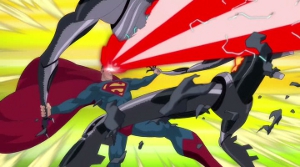
Hold the phone, Smallville. Sounds like someone’s been watching Sam Raimi’s Spider-Man trilogy because that’s a Peter Parker line if I’ve ever heard one. These initial Lois and Clark interactions filled me with The Fear by reminding me of their worst periods of the 1990s: when these two – who should, by all rights, be the premier couple of superhero comics, despite Reed and Sue Richards‘ usurpation of that title – were so angst ridden it was terrifyingly hard to tell what either one of ’em saw in the other. As usual, I’m with Lois, who feels Clark is being a controlling ‘fraidycat, unable to commit to a real relationship, because he is:
Lois: I’m not talking about people knowing I’m with Superman. I’m talking about people knowing I’m with Clark.
Clark: And what if someday people find out that’s the same person?
Lois: Then we’ll deal with it! I’m in danger all the time, Clark.
Clark: And I’m not thrilled with that, either.
Jesus, I thought, who is this imbecile? You put on tights and get into fights with the explicit goal of publicly inspiring others to Do The Right Thing…and you’re surprised when the woman you claim to love follows your example? She couldn’t melt their guns with a glance so she volunteered to be a hostage, and her reasoning (“Better me than someone else.”) should shut you right the fuck up, Clark. Because it’s the same reasoning you use every damn day. Another (animated) version of you put it pretty succinctly, this one time, when you still hung out with the Justice League:
Superman: I’m the invulnerable one. Every punch I take is a punch someone else doesn’t have to.
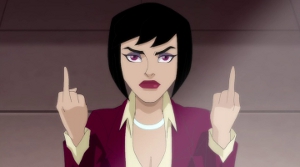
Besides, if there were any smart armed robbers left in Metropolis, they’d have realized kidnapping Lois Lane was tantamount to printing their own ticket to Stryker’s Island. But there aren’t any smart ones left in Metropolis, are there? Someone went around doing the right thing and put them all out of business. Sure, it left the field wide open for freaks like “Ugly” Manheim, Parasite, or Toyman, but that’s escalation for ya. Fly to Gotham and interview Jim Gordon, ask him about it sometime. Man could use a profile in a major national daily, anyway. The ladies (the ones who buy major national dailies, at any rate) love a salt n’ pepper ‘stache.
This version of Lois, though, is just as self-absorbed as this Clark, so she counters his controlling super-dicketry with a “me” diatribe:
Lois: Well, what about me? You think I like sharing you with the world, wondering if today’s the day some lunatic figures out how to kill you? But I don’t tell you not to do your job and you can’t tell me not to do mine.
True, but he can avoid telling you anything, because his next line is, “I have to go away for awhile.” Great, Clark. Real mature. Then again, a humanoid robot did land in Arizona, and Kara recognized it as the scout-bot of the technological monstrosity that attacked Krypton in its final days, before straight-up stealing the planet’s capital city of Kandor. So this Supergirl’s PTSD flows, not from – as in the 1950s – watching her friends and family die slow from radiation poisoning (one of the top five Horrible Ways To Go, no matter what universe you’re in), but from watching a space-born cyborg named Brainiac commit Grand Theft Civic Center.
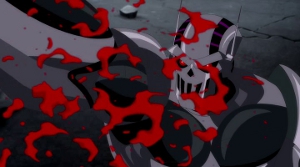
Here, at last, we see Geoff John’s major obsession: cherry-picking story elements from ’60s comic books and dirtying them up with as much Dark Age grime as he can manage. Because he knows doing so will get people like me talking. Doesn’t matter how inconsistent and/or gratuitous these elements might be – like the Planet’s gratuitously piggish Sports Editor, Steve Lombard (the eternally-identified-with-the-Drew-Carey-Show Diedrich Bader) – or the fact Brainiac can scan, and absorb the knowledge of, organic minds with a simple, non-invasive laser, yet his Terminator-clones gather data through the much-more-reliable-I’m-sure method of spearing motherfuckers through the head with spikes. (Guess you’d call that a “Universal Serial Brain” port?)
Whether I like it or not, this is a winning combination of elements. It’s won Johns a dedicated fanbase that probably slipped on their Red Lantern rings the moment I started talking about him in non-superlative language. I invite them all to puke their rage into my comment section, because I’m about to call Johns a bad writer. He’s a great conceptualizer – he can conjure up an Event faster than anyone this side of Grant Morrison – and his dialogue is always straightforward, no frills stuff. This means that, most of the time, it’s a perfunctory hurtle between Johns and the next full-page illustration of a Big Ticket Moment, which he seems to prize above all else (even more than Hal Jordan or Barry Allen).
This Event being the return of Brainiac to his mid-60s origins as a city-shrinking, planet-annihilating, two-dimensional antagonist. I’ll admit, Brainiac’s Dark Age origin as a psychic carny with a dead alien scientist riding shotgun in his head was…pretty weird…but it was also a lot more interesting. Rogue alien war machines out to destroy the universe are a sci-fi cliché, older than most branches of actual computer science. Superpowered sideshow hucksters are a lot rarer.
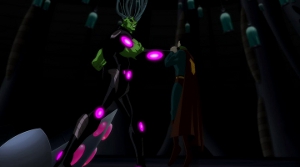
But I’ll bet real money Johns’ conceptual process didn’t go much beyond, “The Brainiac I met in that box full of old comics was a straight-up cyborg, so straight-up cyborg he will be!.” This allowed Johns to re-do the classic Bottle City storyline and throw one more extraterrestrial threat at the no-longer-Last Son of Krypton. Because, as Clark discovers once he grows a spaceship in the Fortress and sets out to find the threat, Kandor is safe and sound inside Brainiac’s ship, with over a hundred thousand Kryptonian citizens preserved as “specimens.” Unlike his 1958 forefather, this Brainiac has no home world to repopulate. He seeks to “become” the universe by absorbing all the data he can find and destroying all the chaotic, illogical, disgusting life that generated it.
But, as Kara’s dad Zor-El (Stephen Root) says to a captured-and-bottled Clark, “you can’t control a living thing without destroying what’s alive about it.” There’s even a cut-away reaction shot just so we can watch this sink through Clark’s thick skull. And here I realized how wrong I’d been from the start, and that screenwriter Bob Goodman is much better at this than the writer he’s adapting.
As you’d expect from a sixteen-year veteran staff writer of DC’s televised cartoon shows, Goodman knows what Johns does not care to: how to fuse elements from decades of comics into a coherent story without pulling colored rings out of your ass. In this case, it’s a story about control, as I should’ve realized from the not-subtile trumpeting of the theme in Lois and Clark’s dialogue. But seeing a DC animated feature even bring up a theme, let alone successfully explore it, is still a novelty. Seeing that Clark’s initial idiocy was not a deliberate bit of character assassination on the part of his creators (as it so often is), but a deliberate exercise in character building, is even more heartening. Clark needs to begin a paranoid super-dick and absentee cousin in order to do what he does at the end: grow up and start acting like a functioning adult, without resort to the jovial patronizing that passed for “masculinity” back in the 50s.
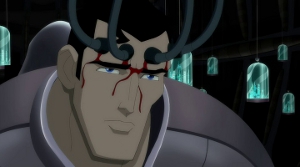
Because this is also a story about the limits of control, the unpredictable chaos of life, and having the courage to live and glory in the fact you are alive. It’s certainly better than the alternatives available. Idiots like to call Superman “omnipotent” because they haven’t read through page after page of him dealing with not being omnipotent (his primary source of angst), the same thing we boring, normal people struggle with all the time. In Brainiac, Superman encounters a being with no capacity to angst over anything – as unquestionably certain of its own importance as a hot shot writer whose comic books sell hundreds of thousands of copies. Twice Brainiac calls itself “the knowledge and strength of ten thousand worlds” and you don’t have characters say the same thing twice unless you want it to really sink in. “Knowledge” is, obviously, not “wisdom,” which you can only gain through experience, and Brainiac only experiences the steps in his quest for knowledge. Faced with the awful (as in “full of awe”) vastness of organic existence, guys like Brainiac fold like one of Clark’s cheap suits. The way Clark himself would fold if he didn’t have friends and didn’t treat them right, occasional dickishness notwithstanding.
The thing is, as Superman fans, we’re used to writers fucking the Man of Steel up for the sake of easy drama, or using him as a two-legged soap box. In those people’s hands, Clark’s dicketry becomes a cheap excuse to make other characters (or humanity in general) look better, or comic book fans feel worse. Whenever someone, somewhere, puts the time and effort into developing a character arc for Smallville’s favorite immigrant, that person should be carried through the streets on a path of rose petals as crowds chant their name. We don’t have to keep strip-mining Donner’s films, ya know? We could just accept them as products of their time and move on.
Thankfully, DC seems to’ve done just that, once again improving the story it adapted. Last time, one issue became an effective, seventy-five minute film I like more every time I watch it. This time, all involved turned a simple prologue for a Johnsian Event (the New Krypton arc) into a self-contained story with a beginning, middle, end, and a point to make. Making Superman: Unbound a worthy follow-up to 2012’s Superman vs. The Elite and 2011’s All-Star Superman. Looks like Jonathan Kent’s son is finally on a real winning streak. Here’s hoping the trend holds…but, even if it doesn’t, three in a row ain’t bad.
![]()
![]()
![]()
![]()
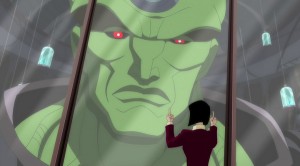

First things first, congratulations on getting back up and running.
As for the title, I think it’s an awesome allusion to Hercules; Unchained.
Speaking of editorializing, I could use some clarification: when you mention the “proto-fascist Strong Father archetype,” whom are you referring to? Do you mean Superman himself, the whatever the patronizing censor decides is allowable, or the parents who want their children protected?
As a father myself I’ll say that I once bitched about people trying to protect me from myself but the debate gained a whole new dimension the first time my daughter handed me a Barbie movie (you want to talk about movie pain, this is it) and my world shifted into ‘protecting the children’ from omnipresent brand indoctrination and the dangerously sophisticated mind control of modern corporate marketing while trying to keep her little eye’s only on things in that sweet spot between stuff that might warp her and the super sanitized and IQ limitingly insipid children’s entertainment that is everywhere these days. Fascistic paternalism only becomes so when the protections aren’t relaxed at the same rate as the protected persons ability to deal with it. Unlike parents, corporate entities seem to have developed this strange idea that growing with their progeny is just too much trouble so they age to a point and ditch you. You talk a lot about the cosmic reset button but I’ve seen it happen in the video game world too; just look at Squaresoft I followed them through the first 6 games then they reset the maturity to grab the angsty teen market money pool, made a boatload of money and tried to tread water there as long as they could, by game 10 they were trying to grab the angsty teen again and just wishing the culture that they had helped develop would just shut up. The only arts that will take you from maturity’s cradle to grave are literature and film, and the more collaborative and expensive film becomes the less willing/able they are to engage any population outside on the modern marketing group-think.
And forget studio madhouse, I want to see Superman as envisioned by Studio Ghibli.
Whatever the patronizing censor decides is allowable, usually defined as “Whatever their favorite backward-ass politician or talk radio personality said was allowable.” And to clarify further (and preemptively soothe any ire I might unintentionally raise with the micro-rant to follow), I’m not talking about actual parenting. I have no right to impugn anyone’s parenting, though I should warn you that
is a futile maneuver. In fact, if she’s begging you for Barbie movies (and receiving them? Say it ain’t so, because that I have no compunction about impugning, loudly, and in public) it’s already too late. Best you can do now is bore her to tears patiently explaining why Barbie is a vacuous piece of sexist propaganda who paints a picture of adulthood so narcissistic and evil I honestly wouldn’t be surprised to learn of Dark Age Lex Luthor’s involvement in its conception. Hopefully some stray piece of that will stick to the walls of her mind and she’ll win the playground fights contrary readings of a popular iconography inevitably inspire. I can only say, “It did wonders for me.” And it could’ve been worse: at least it wasn’t a Tinkerbell movie.
But we weren’t really talking about that, or fascistic corporate paternalism. A corporation “growing with their progeny” is out of the question – such entities don’t have progeny. Or any sense of responsibility to anything other than themselves. They genuinely do not care. To them, we are little more than open mouths with full wallets tied to a gap between our incisors. This is what most of the “group” “thinks” about, and all this group-think leads to the angst-ridden 13-35-year-old demographic because those are the biggest mouths, with the fattest wallets. Their “thinking” begins and ends at, “How do I reach in there and grab the most with minimal damage to myself?” They might get their knuckles bruised or lose a finger, at the extreme worst, but that’s where the Not Caring comes in again.
It’s a fascinatingly awful (as in “fucking awful”) process of Anti-Creativity and amoral exploitation. One we’ll never get anywhere close to dealing with if we keep wasting our time counting curse words, unclothed (usually female) sexual characteristics (it’s okay to play male sexual characteristics for comedy, because that’s our Privilege), visible pints of blood and/or anything else that made Tipper Gore feel icky when her daughter handed her Prince’s Purple Rain album back in the early-80s.
Sadly, obsessive-compulsive, moralistic assholes (and, by now, their asshole children) seem to be the only people willing to put forward articulate and honestly critical readings of Geoff Johns’ work. At the very least, they were the only real critical voices I encountered in my (admittedly brief) survey of writing on the subject. He is a shallow, callous, image crafter, our Mr. Johns: the Roland Emmerich of his field. A professional, yes, but not too terribly concerned with thinking shit through, and why should he? His audience constantly rewards non-thought by expecting little to nothing more out of him than a cool splash page or three and the death of a main character’s loved ones. Even his fans are starting to wise up, and they’ll complain about all this as enthusiastically as the rest of us, so long as they couch their complaints in safely-ignoreable fan language – “That rat bastard killed Dr. Psycho!” Or, in my case, “That rat bastard killed Pa Kent! Again! Fuck him and fuck Richard Donner, too.” And thank Bob Goodman for removing that from this story.
I guess, at bottom, all this ranting flows from despair over the narrow range of critical thought in the Series of Tubes. Especially when it comes to these direct-to-DVD offerings, which all the “serious” critics ignore and the studios pump out in the hope ignorant parents, looking for 70 minutes of peace and quiet while Uncle Television sits the kids, will unthinkingly buy them because of Salkind Assumption #1 “Superheroes are for children.” The Phyllis Schlafly brigade never went away, so you’ve got them on one pole, sternly lecturing filmmakers out of James Dobson’s parenting playbook. And on the other pole you have…what? Comics Alliance is dead (O’ Discordia!) and the few writers I’d enthusiastically call “good” (Carol Borden, Collin Smith) aren’t rich enough to move the public discourse yet. Fuck me, just contemplating it is enough to drive me to drink. But, then again, so is a stiff breeze.
Give a man some credit, of course I bought them, and of course we watched them, and of course they vanished mysteriously soon thereafter. I plan to ‘find’ them when she’s ~12 and have a little lesson in cultural values when she’s old enough to understand (she’s only 4 now) and be a bit embarrassed by it, maybe we’ll watch one when she brings home her first date. I gave in on it to avoid it becoming a fetish, always a danger in strong willed children.
But you are right, this isn’t about my kid, and you are right about the progeny comment, that’s the wrong word. They are mini-cultures in there own right and it continues to mystify me that while the corporate art industries are willing to build & follow a population through that first period, they aren’t willing to make (or allow to be made) a mature version. It goes against the tenants of greed. Here is a market, they are the only ones with the copyright backed powers to fill it, why don’t they? Instead we have the search for irrelevancies (blood and what have you) but as Mulder put it ‘people ask the wrong question when they want the wrong answer’. I say that Geoff is the answer, so is Bay, and Stephenie Meyer not because they are cheap (as all of the market based arguments would require) but because they are lazy. The entertainment world believes that quality is a frivolity, if you have it great, but otherwise just get it out there and give it an attention grabber. Art is not dead, but it is irrelevant, the money is in entertainment. Orwell did an essay (Boy’s Weeklies) in which he detailed an earlier version of lazy storytelling. It was accepted then too that lazy was good enough for kids, but it’s also true that it’s good enough for adults. The difference is that art has a long shelf life (Dickens, Bede, etc) while shoddy work doesn’t (Care Bears, Starsky & Hutch, etc.). Look in the $5 bins at any walmart and you will see Hundreds of millions of dollars depreciated to shit. It’s to easy to say that bad parents drive this, although they do contribute. Negligent parents have been with us since before they were tying their infants to chair legs in their industrial revolution factories. I posit the culprit is overabundance and advertizing. If the most important difference between art and crap is how people remember it then the threat is that they will be offered so much BS that only a few will even encounter the good among the crap. Modern advertizing is all emotion based. Overuse of emotion exhausts the listener and suffers the law of depreciating returns quickly. It really is like any other kind of propaganda, it discredits its source. That’s one reason I come here, applied critical thinking cuts through the BS. Your beloved art forms may continue to misfire, but presence of people who expect better creates an incentive for improvement. Don’t drink with grief, drink with hope (I know I am), and go watch ‘Chinatown’ or ‘O Brother, Where Art Thou’, it’ll make you feel better.
Glorious! Glad you’re back. Happy to be able to read intelligent review and stimulating comments. We’re out here starving for people who think to talk to. More of us in the trees than you know. Don’t give up on us either. we’re watching Sundance and IFC and LINK and Freespeech T.V. and can usually catch a quality film at 2am.
Is new krypton any good?
In a word? No. As with most Johnsian Events, pieces of it are all right, but the whole never amounts to more than their sum. So the damn thing feels too long because it’s not leading to anything worthwhile. Tight pacing may get you through to the end, but once you turn around and look back at all you’ve read, you realize it amounted to a whole lot of nothing….besides a lead-in to the next big Event in Superman’s titles (J. Michael Straczynski’s run, and the less said about that, the better.)